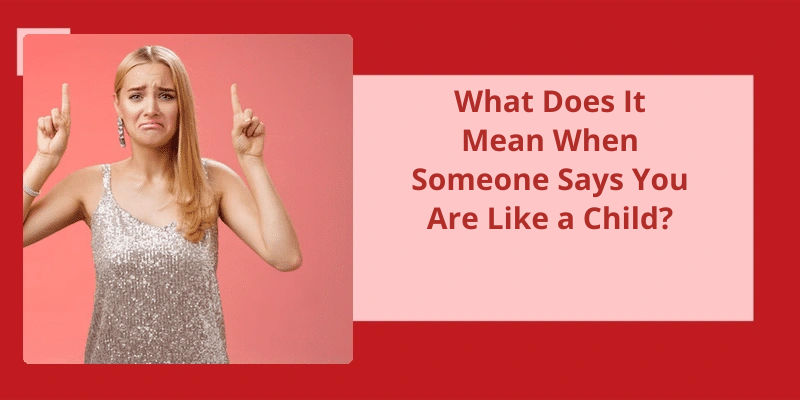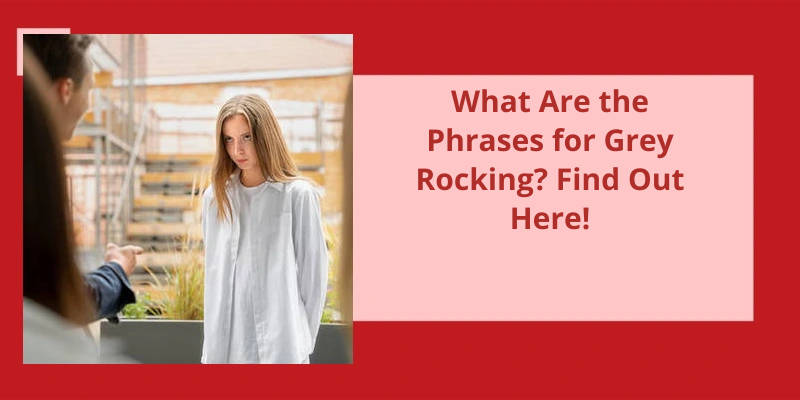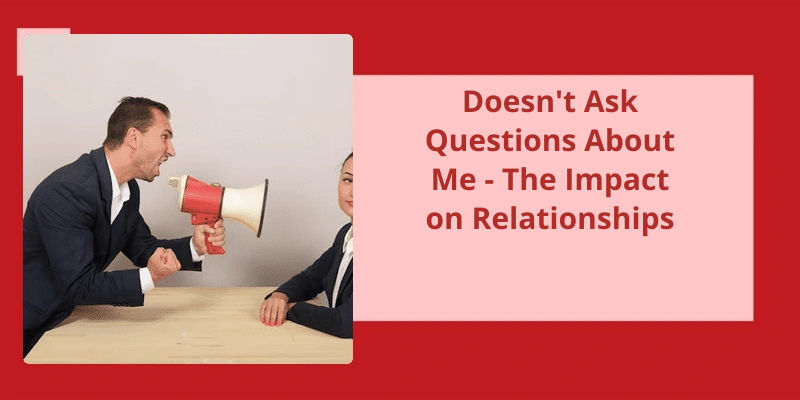Have you ever been told that you’re like a child? Perhaps a friend, colleague, or family member has used this phrase to describe you or your behavior. While it might seem like an innocent comment, the reality is that being likened to a child can often be a condescending and belittling remark. It suggests that the person saying it believes that you’re lacking in mature, adult-like qualities and are instead behaving in a juvenile or childish manner. This can be hurtful and insulting, particularly if you feel that you’re being unfairly judged or misunderstood. So what does it really mean when someone says you’re like a child, and how can you respond to this kind of criticism in a constructive way?
What Is a Childlike Personality?
They’re also spontaneous and adventurous, always ready to explore new things and take risks. Moreover, they’ve a natural curiosity about the world around them, and they ask many questions to satisfy their thirst for knowledge.
A childlike personality is also characterized by a positive attitude towards life. They tend to see the world as a wonderful and magical place, full of possibilities and opportunities. They’ve a natural ability to find joy and happiness in the simplest things, like playing with a toy, looking at the stars, or just spending time with their loved ones.
Being childlike also implies a certain level of vulnerability. Since they’re trusting and innocent, they may be more prone to being hurt or taken advantage of. However, this vulnerability is also what makes them endearing and lovable to others. They’ve a natural charm and charisma that draws people towards them, and they’ve the ability to create meaningful connections with others.
While it may have it’s drawbacks, such as a tendency towards immaturity or naivety, these can be overcome with the right mindset and personal development.
But it’s not just the words they use, it’s also about the tone and body language they exhibit. This type of communication can be frustrating and belittling, and it’s important to understand how to handle it in a mature and assertive manner. So, here are some tips on how to deal with someone speaking to you like a baby.
What Does It Mean When Someone Talks to You Like a Baby?
However, speaking to someone like a baby can also be a way to establish dominance or control in a situation. By lowering the tone of their voice and speaking in a simplistic manner, the person speaking is implying that the other person is beneath them in some way. This can be a dangerous power dynamic, especially if it occurs in a professional or educational setting.
By adopting a sweet, innocent tone, the person speaking may be attempting to soften the blow of delivering bad news or making a difficult request. This can make it harder for the other person to assert themselves or refuse the request, as they may feel guilty for hurting the speakers feelings.
Furthermore, speaking to someone like a baby can also be a reflection of the speakers own insecurities or lack of confidence. By belittling the other person, they may feel as though they’re boosting their own ego or self-esteem. However, this is a shallow and ultimately harmful way to feel better about oneself, as it only serves to isolate and alienate others.
Overall, when someone talks to you like a baby, it’s important to recognize it as a warning sign of disrespect, manipulation, or power dynamics at play. It’s important to assert your own intelligence and knowledge, and to refuse to allow others to make you feel small or inferior. By standing up for yourself and refusing to engage in these types of interactions, you can help break down these harmful patterns of communication and promote healthier, more equal relationships with others.
While both words share a similar definition, their connotations have evolved to have very different meanings. This is particularly true of the word “childlike,” which is now commonly associated with a positive or neutral sentiment. Despite this, the question remains: is being childlike truly a positive trait, or is it more of a negative one? In this article, we’ll explore this question in more depth and try to shed some light on the debate surrounding this topic.
Is Childlike Positive or Negative?
It implies a sense of innocence, wonder, and curiosity that we often associate with childhood. Being childlike means having a sense of playfulness and spontaneity, which can be a positive attribute in certain situations. It suggests an open-mindedness and willingness to learn that’s essential for personal growth and development. Children are often seen as being highly imaginative and creative, and being childlike can help adults tap into those qualities.
However, there can also be negative connotations associated with being childlike. It can imply a lack of maturity or responsibility, particularly in situations where those qualities are required. There’s a certain vulnerability that comes with being childlike, particularly in a world that can be harsh and unforgiving.
The distinction between being childlike and childish can be an important one. Childish behavior is generally seen as negative, and can be associated with petulant or immature behavior. It often involves a lack of self-control and an inability to handle difficult emotions or situations in a mature way.
In creative environments, a childlike attitude may be valued for it’s ability to inspire and generate new ideas. In more professional settings, on the other hand, being childlike may be seen as a sign of immaturity or unprofessionalism. As with most things in life, it’s important to strike a balance between different qualities and approaches, taking into account the specific demands of the situation at hand.
The Role of Childhood Experiences in Shaping One’s Childlike or Childish Behavior
Childhood experiences can greatly influence how a person behaves in a childlike or childish manner as they grow older. These experiences can include positive memories and interactions that encourage a sense of playfulness and wonder, as well as negative experiences that may lead to a lack of maturity or emotional regulation. Understanding the impact of these experiences is important for individuals seeking to break out of negative patterns and develop healthier, more balanced behaviors.
Source: The Difference Between ‘Childish’ and ‘Childlike’
In social situations, the way we express ourselves can have different meanings depending on the context and the receiver. When someone calls you a child, it may not always be straightforward. However, it could be a term of endearment expressed by someone fond of you. Nonetheless, some people may find it offensive as it implies a certain level of immaturity. In this article, we will explore what it means when someone calls you a child and the different connotations that could come with it.
What Does It Mean When Someone Calls You a Child?
However, there are times when calling someone a child can be used in a negative way. If someone is being called a child in a situation where they should be taking more responsibility or acting more maturely, it can be seen as an insult. It can also be used as a way to diminish someones opinions or actions, making them seem insignificant or unimportant. In these cases, being called a child can feel belittling and condescending.
There are also cultural and societal connotations to being called a child. In some cultures, the term “child” is often used to refer to someone who’s unmarried and still living at home with their parents. In Western society, being called a child can sometimes be associated with being naive, inexperienced, or unintelligent. These associations can be hurtful and damaging, and it’s important to understand the context in which the term is being used.
It can be a term of endearment, indicating fondness and affection, or it can be used in a negative way to diminish someones opinions or actions. It’s important to understand the cultural and societal connotations of the term, as well as the context in which it’s being used, in order to interpret it’s meaning accurately. Ultimately, it’s up to the individual being called a child to decide whether or not they find it a term of endearment or an insult. Communication is key in these situations, and it’s important to express ones feelings and thoughts clearly in order to avoid misunderstandings and hurt feelings.
The Psychology Behind Why People Use the Word “Child” as an Insult
Most people use the word “child” as an insult because it implies immaturity, naivety, and incompetence. Insulting someone by calling them a child can be an effective way to belittle or discredit their opinions or actions, as it suggests that they aren’t grown up enough to be taken seriously. Additionally, some people use this insult to express their frustration with individuals who they perceive as being overly emotional, naive, or immature. While this insult can be hurtful, it’s important to recognize that using it says more about the speaker’s own biases and beliefs than it does about the person they’re insulting.
Words carry meaning and using them carelessly can result in unintended consequences. This is especially true when it comes to children who’re sensitive to the language used to describe them. Using language that belittles them can be demeaning and discouraging. One such term is “kid”, which, despite it’s common usage, can carry negative connotations. It’s important to consider the impact of our words on children and to choose our language carefully to convey respect and kindness.
Is It Rude to Call a Child a Kid?
When it comes to addressing children, it’s important to be mindful of the language we use. Many people may think that calling a child a “kid” is harmless, but it’s actually a form of casual and potentially demeaning language that can unintentionally discourage and disrespect children.
Children are growing and learning every day, and they need to be spoken to in a way that acknowledges their potential as individuals. Referring to them simply as “kids” trivializes their intellectual capabilities, passions, and interests and will likely discourage them from expressing themselves.
It’s a slang term that’s used in informal settings, and using it in a formal environment with someone you don’t know well can indicate a lack of respect. The same goes for using “boy” or “girl” for young males or females. This can also demonstrate a lack of professional communication skills and may alienate and annoy some people.
It’s essential to give children the respect they deserve from the earliest stages of development. Using language that not only empowers them but also respects them as individuals is vital to building their confidence and self-esteem. When we use terms like “child” or “youngster”, we acknowledge their childlike qualities while also recognizing them as individuals with their own distinct qualities.
Our goal should be to encourage and uplift children, recognizing their unique abilities and potential, and referring to them in a way that depicts that level of respect will do wonders to build childrens personality and characteristics.
It’s not uncommon for adults to succumb to their childish tendencies, whether it be throwing an unnecessary tantrum or refusing to compromise. However, acting childish can have negative consequences and may hinder personal growth. Let’s explore the implications of childlike behavior.
What Does It Mean When You Act Like a Child?
Acting like a child is often seen as immature or bratty behavior. It can be characterized by a lack of responsibility, self-control, and overall emotional maturity. When someone acts childish, they may throw tantrums, refuse to take responsibility for their actions, and demand attention or special treatment.
One of the most common reasons people act like children is when they’re feeling overwhelmed or frustrated. This can happen at any age and is often a result of stress, anxiety, or other emotional triggers. When someone is feeling out of control, they may regress to a childlike state in order to cope.
This can be especially common among younger people who’re still learning how to navigate the complexities of life. When they’re faced with challenges or uncertainties, they may act out in ways that are immature or irrational.
In some cases, acting like a child can be a symptom of a larger psychological issue. People who struggle with personality disorders, for example, may exhibit childlike behavior as a result of their underlying mental health condition. This can be particularly challenging to deal with, as it often requires professional intervention and therapy to address.
Ultimately, acting like a child isn’t a healthy or sustainable way to handle lifes challenges. While it may be tempting to lash out or retreat into a childlike state, it’s important to remember that true growth and progress require emotional maturity and responsibility. By recognizing and addressing the underlying issues that may be contributing to childish behavior, individuals can work towards a more fulfilling, responsible, and mature way of living.
How to Deal With Someone Who Acts Like a Child in a Professional Setting
- Stay calm and composed.
- Avoid responding in an emotional manner.
- Listen attentively and try to understand their perspective.
- Offer constructive feedback and encourage positive behavior.
- Set clear expectations and boundaries.
- Be firm and consistent in your responses.
- Avoid escalating the situation and seek mediation if necessary.
- Remember to maintain professionalism at all times.
Conclusion
However, being compared to a child shouldn’t always be taken as an insult. Children are often viewed as innocent, curious, imaginative, and free-spirited. These are qualities that we should strive to hold onto throughout our lives. Being like a child can mean that you’ve a sense of wonder and playfulness that others may lack. It can also mean that you’ve an open mind and are willing to learn and grow. So, next time someone compares you to a child, don't immediately take offense. Instead, embrace the positive qualities that come with being child-like and continue to learn, grow, and explore the world around you with a curious and open mind.






